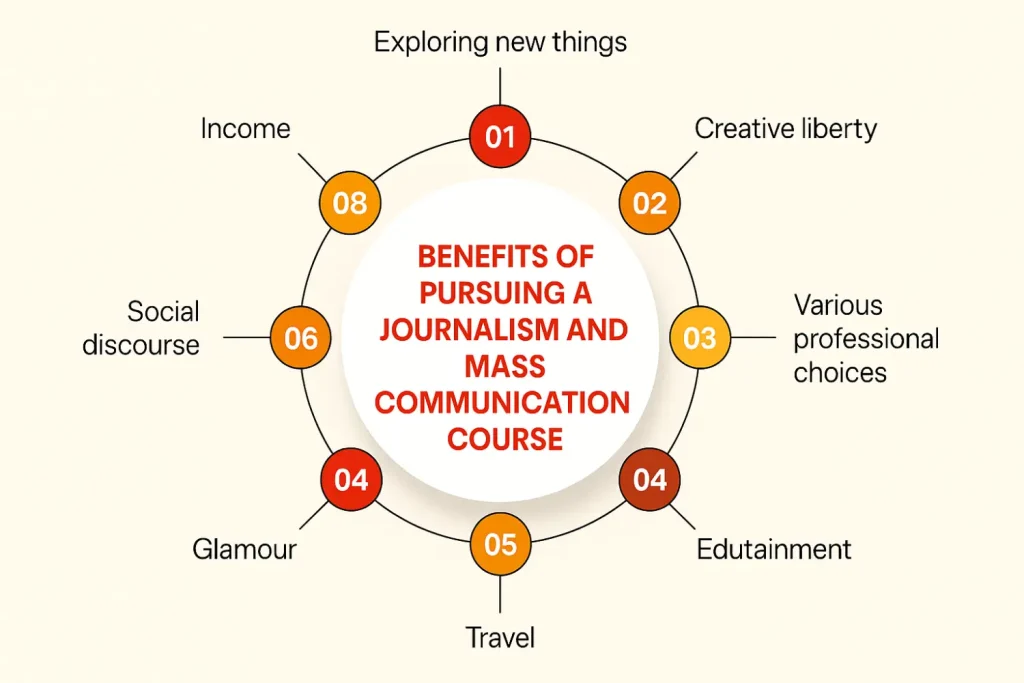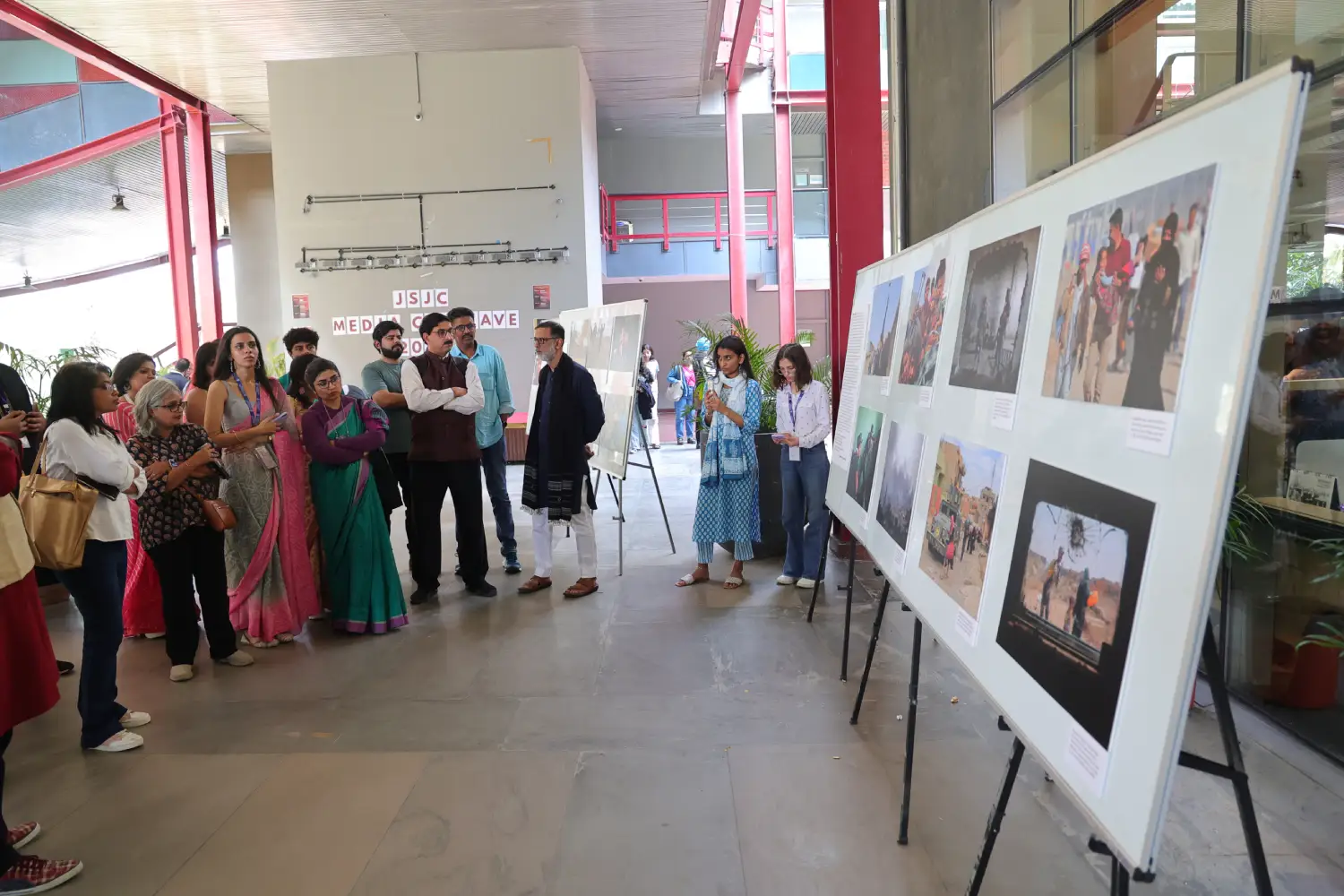Journalism is a professional approach to facts and information that is not easily available to the public. It emphasizes accuracy, integrity, and the use of credible sources, avoiding exaggeration or distortion. The primary goal of a journalism course is to instill a strong sense of responsibility and accountability in students, preparing them for a principled and impactful career in the media.
Over the years, the power and popularity of mass media have created an influx of various content, while journalism has taken a backseat. Nonetheless, the very essence of journalism never fully dissipates for those willing to fight for the truth.
The Evolution Of Journalism & Mass Media: A Historical Perspective
The first traces of journalism come from the ancient city of Rome, around 59 B.C., where the first news sheet was circulated or hung in prominent places across the city, documenting everyday events. Since then, there have been many historical instances in China, Germany, and other places where circulars or notices were written to inform the public.
News circulation through printing presses began in the 1600s, and the first recorded daily newspaper was the Daily Courant, published in 1702. From there on, journalism and news publication have only increased dramatically, and with the advent of the digital mediums in the 21st century, the idea, purpose, and consumption of media content have also evolved. In India, the first record of a newspaper is The Bengal Gazette by James Augustus Hickey in the year 1780.
A journalism course in 2025 incorporates a seamless blend of historical references and modern principles and techniques to give students an overview of the evolution of journalism through the evolving media landscape.
Different Types Of Mass Media: Print, Electronic, And New Media
Media is nothing but a tool and vehicle for mass communication, and traditionally, there have been means like rituals, folklores, sculptures, symbols, festivities, and other ways through which information was passed down from one generation to another. Since the invention of the first printing press, the publication of newspapers and other reading materials has increased exponentially.
Print Media: Newspapers and magazines became the very first form of circulation for public consumption, and even in the midst of the 21st century, print media has not only survived but is also going strong in the face of electronic and digital media. There are various forms of print media available today, which still uphold the original values of journalism.
Electronic/ Broadcast Media: Radio was invented in the late 1890s, and the news appeared around the 1920s with the likes of NBC & CBS. Television came into being around the same time, and broadcasting of audio and video news content was like never before.
Digital/ New Media: The advent of the Internet changed the distribution and consumption of media content to the next level. Digital media or new media is an interactive medium where consumers have the right to be active participants and often the producers of content.
Other than these, there are other forms of mass media like films, video games, billboards, music, advertisement banners, and more that have become quite normal in our everyday lives.
The Importance Of Factual Reporting In Times Of Digitalisation
While the mediums for mass communication have evolved significantly with exceptional technologies like Artificial Intelligence, factual reporting is still valued and often considered a top priority to establish a standard for journalism. The digital media allows for a robust publication of news content and also ensures fast reach and virality, which is good for the publisher. But the virality can also be used to spread misinformation, resulting in the immediate need for fact-checking.
Accurate reporting becomes especially vital during times of crisis, such as wars, earthquakes, or tsunamis. In such moments, the role of journalism in delivering verified, unbiased information is critical. For instance, the recent India-Pakistan conflict highlighted the urgent need for honest and accountable journalism, as media outlets in both countries struggled to fulfill their primary responsibility of presenting the truth to the public.
Benefits of Studying Journalism Courses After 12th
The application for a journalism course after the 12th boards is the very first step towards learning the ethics and ethos of professional news reporting. The curriculum of the course is designed in a way that provides students with the necessary skillset for working in any part of the media.
Media studies are not just restricted to journalism; thus, the course includes technical and tactical training as well. Apart from news reporting, videography, editing, sound engineering, designing, and script writing are some of the other skillsets that are highly valued in the industry.
How Jindal School Of Journalism & Communication Produces The Best Line Of Journalists & Media Persons?
In the digital age, mass media have become a powerful force capable of shaping narratives and influencing public opinion. Recognizing this impact, the Jindal School of Journalism and Communication (JSJC) offers some of the diverse journalism courses designed for students who have completed their 10+2 education and achieved a minimum of 50% in the JSAT or equivalent entrance examinations.
The programme provides a comprehensive foundation in the history of Indian and global journalism, mass media, and the tools of modern communication. It also covers essential research methodologies and technical skills required for effective media practice. JSJC places a strong emphasis on nurturing sincere and socially responsible individuals who aspire to make a meaningful difference through journalism.
Graduates of the B.A. (Hons.) Journalism & Media Studies program can pursue diverse careers as anchors, editors, photographers, journalists, videographers, content writers, radio jockeys, social media managers, and more. Alumni have successfully secured roles at leading media organizations such as NDTV, Indian Express, India Today, and NewsX .
For those with a passion for storytelling and a commitment to truth, JSJC offers the ideal environment to build a career that is both impactful and future-oriented.
Source Links
- https://www.britannica.com/topic/journalism
- https://www.universalclass.com/articles/writing/journalism-a-brief-history.htm
- https://leverageedu.com/blog/types-of-mass-media/
- https://courses.lumenlearning.com/suny-amgovernment/chapter/the-evolution-of-the-media/
- https://madrascourier.com/opinion/in-the-fog-of-war-journalistic-integrity-is-the-first-casualty/






